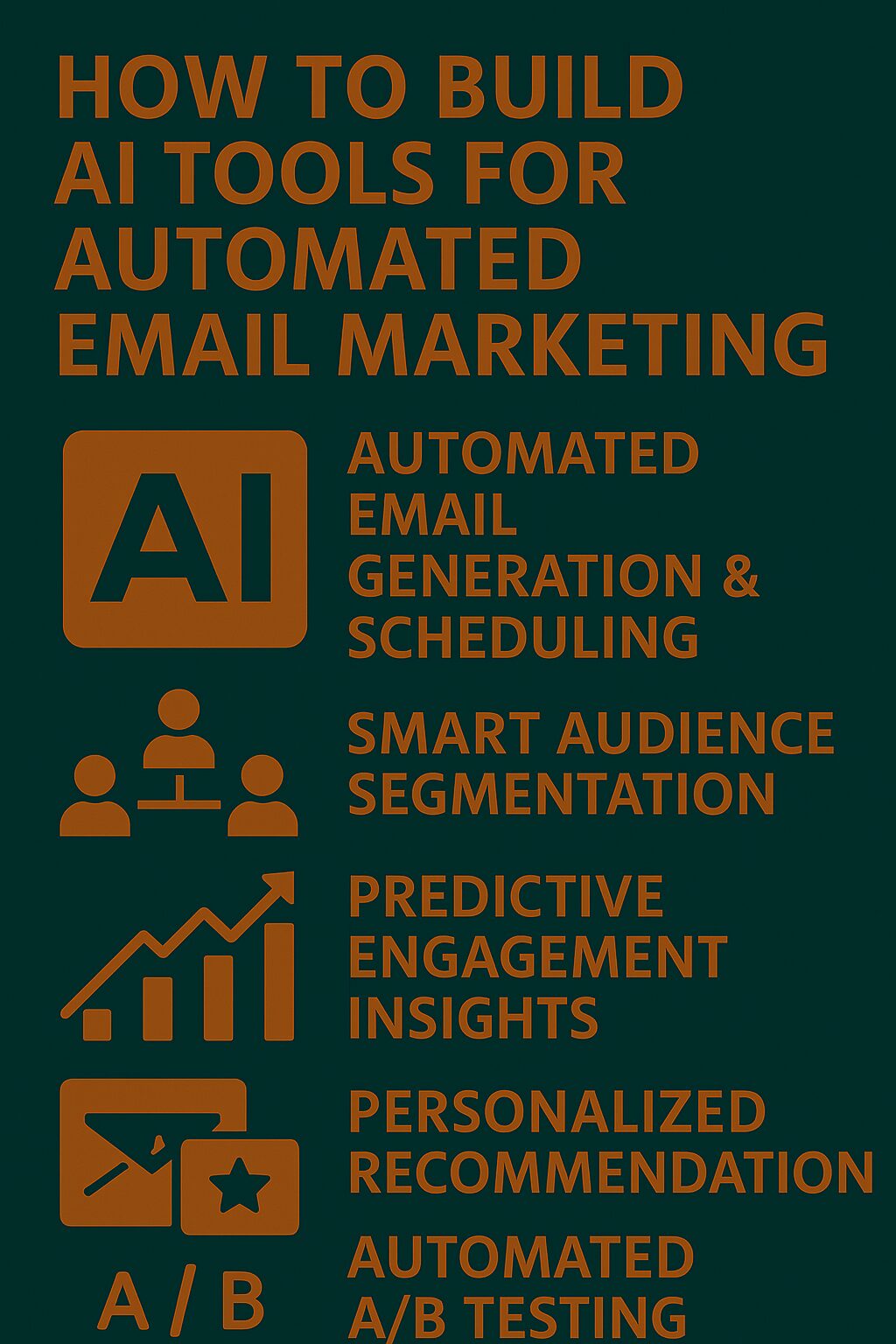Introduction
AI-powered email marketing tools revolutionize how businesses engage with customers, optimize outreach, and boost conversions. By leveraging machine learning, automation, and predictive analytics, AI enhances personalization, automates campaign management, and improves audience targeting.
This guide outlines how to build AI tools for automated email marketing, ensuring SEO-friendly formatting for improved online visibility and marketing effectiveness.
1. Why AI is Transforming Email Marketing
Traditional email marketing relies on manual segmentation and generic messaging. AI optimizes email campaigns by personalizing content, automating workflows, and predicting customer behavior.
Key Benefits of AI in Email Marketing
- Automated Email Generation & Scheduling – AI creates targeted messages and sends them at optimal times.
- Smart Audience Segmentation – AI groups recipients based on behavior and preferences.
- Predictive Engagement Insights – AI forecasts open rates and user interactions.
- Personalized Recommendations – AI tailors email content for higher engagement.
- Automated A/B Testing – AI optimizes email performance using real-time analytics.
AI maximizes customer engagement and improves marketing ROI.
2. Core Technologies Behind AI Email Marketing Tools
AI-powered email marketing tools leverage machine learning and automation to streamline marketing efforts.
Essential AI Technologies for Email Automation
- Natural Language Processing (NLP) – AI generates compelling email content using language models.
- Machine Learning for Predictive Targeting – AI analyzes user behaviors to refine segmentation.
- AI-Powered Personalization Engines – AI customizes subject lines, offers, and product recommendations.
- Automated Email Workflow Optimization – AI streamlines campaign scheduling and distribution.
- Advanced Analytics & Performance Tracking – AI improves email effectiveness based on engagement data.
These technologies enhance email marketing strategies and automation efficiency.
3. Step-by-Step Guide to Developing AI Email Marketing Tools
Building AI-driven email marketing platforms requires structured development and integration.
Steps for AI Email Marketing Tool Development
- Define Email Marketing Objectives – Identify campaign goals, personalization needs, and automation requirements.
- Collect & Analyze Customer Data – AI requires user interaction data to refine segmentation and targeting.
- Develop AI-Powered Email Creation Models – AI generates dynamic content, subject lines, and offers.
- Integrate AI with CRM & Email Platforms – AI should sync with tools like HubSpot, Mailchimp, or SendGrid.
- Enable AI-Powered Campaign Optimization – AI must refine email performance using A/B testing and engagement metrics.
- Monitor & Improve AI Email Accuracy – Continuously enhance AI recommendations based on feedback.
Following this structure ensures effective and scalable AI-driven email marketing solutions.
4. SEO Optimization for AI Email Marketing Platforms
SEO ensures AI email marketing tools gain visibility and reach target audiences effectively.
Best SEO Strategies for AI-Powered Email Tools
- Keyword Optimization – Use terms like “AI email automation,” “smart email marketing,” and “AI-powered audience targeting.”
- Content Marketing & Case Studies – Publish insights showcasing AI-driven email campaign success.
- Mobile-Friendly & Responsive Email Design – Ensure AI-optimized emails work across all devices.
- Strategic Partnerships & Collaborations – Partner with digital marketing experts for credibility.
- Optimized Metadata & Search Tags – Enhance search rankings with refined page titles and descriptions.
SEO strategies boost engagement and adoption of AI-driven email marketing platforms.
5. Improving AI Email Marketing Tools for Long-Term Success
AI email marketing platforms require continuous refinement to remain effective and competitive.
Metrics for AI Email Optimization
- Email Open Rate & Engagement Tracking – AI should refine subject lines and messaging for better performance.
- Click-Through Rate & Conversion Analytics – AI must optimize recommendations to boost conversions.
- Audience Segmentation Accuracy – AI should improve targeting based on user interactions.
- AI-Driven Spam Detection & Compliance – Ensure AI emails align with email regulations and avoid spam filters.
- Scalability & Multi-Platform Integration – AI email tools should work across email providers and CRM platforms.
Regular improvements ensure AI-powered email automation tools remain effective and valuable.
Conclusion
AI-powered email marketing solutions optimize customer engagement, email personalization, and campaign automation. Businesses integrating machine learning, predictive analytics, and automation into their email marketing strategies enhance efficiency, improve conversions, and boost brand engagement.

